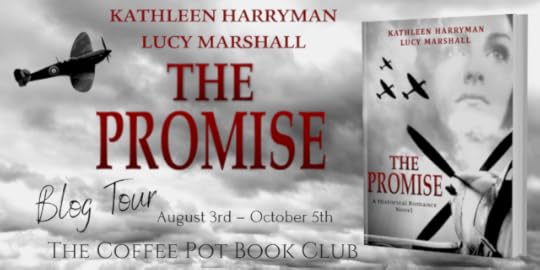Mary Anne Yarde's Blog: The Coffee Pot Book Club , page 75
August 25, 2020
Welcome to Day #2 of the blog tour for The Smallest Crack by Roberta Kagan @RobertaKagan @authorrochelle

The Smallest Crack
Book One of the Holocaust Story Series
By Roberta Kagan

1933 Berlin, Germany.
The son of a rebbe, Eli Kaetzel, and his beautiful but timid wife, Rebecca, find themselves in danger as Hitler rises to power. Eli knows that their only chance for survival may lie in the hands of Gretchen, a spirited Aryan girl. However, the forbidden and dangerous friendship between Eli and Gretchen has been a secret until now. Because, for Eli, if it is discovered that he has been keeping company with a woman other than his wife it will bring shame to him and his family. For Gretchen her friendship with a Jew is forbidden by law and could cost her, her life.
Today we are stopping over on
The Historical Fiction Blog for a sneak-
peek between the covers of The Smallest
Crack.
Click HERE!

Welcome to Day #7 of the blog tour of The Last King: England — The First Viking Age (The Ninth Century Book 1) #HistoricalFiction #GreatReads @CraftygasheadZo @coloursofunison
The Last King: England: The First Viking Age
(The Ninth Century Book 1)
By M J Porter

They sent three hundred warriors to kill one man. It wasn’t enough.
Mercia lies broken but not beaten, her alliance with Wessex in tatters.
Coelwulf, a fierce and bloody warrior, hears whispers that Mercia has been betrayed from his home in the west. He fears no man, especially not the Vikings sent to hunt him down.
To discover the truth of the rumours he hears, Coelwulf must travel to the heart of Mercia, and what he finds there will determine the fate of Mercia, as well as his own.
Today we are stopping over at
Zoe's Art, Craft and Life
Click HERE!
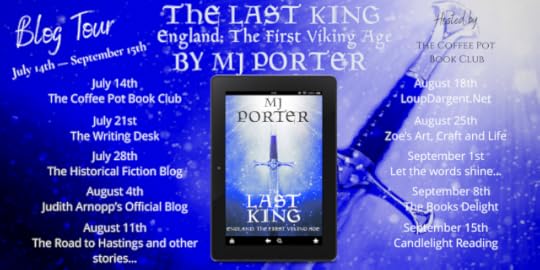
August 24, 2020
Historian and author, Linda Porter, is sharing an excerpt from her fabulous book — Mistresses: Sex and Scandal at the Court of Charles II #Stuarts #HistoricalBiography @DrLindaPorter1

Mistresses:
Sex and Scandal at the Court of Charles II
By Linda Porter
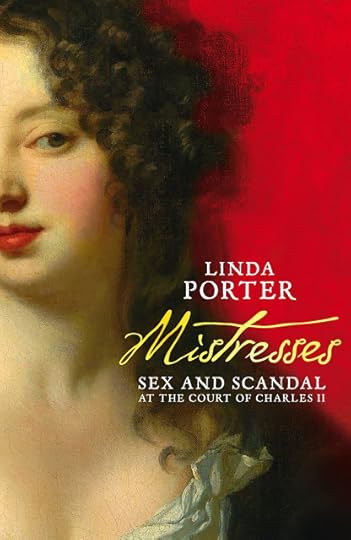
According to the great diarist, John Evelyn, Charles II was ‘addicted to women’, and throughout his long reign a great many succumbed to his charms. Clever, urbane and handsome, Charles presided over a hedonistic court, in which licence and licentiousness prevailed.
Mistresses is the story of the women who shared Charles’s bed, each of whom wielded influence on both king and country in their very different ways. Lucy Walter, Barbara Villiers, Frances Teresa Stuart, ‘pretty, witty’ Nell Gwyn and her fellow-actress Moll Davis, who bore the last of the king’s fourteen illegitimate children, between them dominated court gossip during the Restoration period. Here, too, is the French aristocrat, Louise de Kéroualle and the flamboyant Hortense Mancini, as well as Charles’s humiliated, childless queen, the Portuguese princess, Catherine of Braganza, who managed to forge an independent identity for herself.
Drawing on a wide variety of original sources, including material in private archives, Linda Porter paints a vivid picture of these women and of Restoration England, an era that was both glamorous and sordid.
Praise for Mistresses
“In telling the story of Charles's mistresses, Porter skillfully interweaves the politics with the passion . . . an enlightening read.”
Tracy Borman, The Sunday Times
“The lives of these seven women make a terrific story and Porter tells it well.”
Andrew Taylor, The Times
“Takes a fresh look at Charles' reign through the many women who shared his bed . . . an interesting approach: after all, we all know that rulers act out of personal satisfaction as much as political sense.”
The Herald
“A stunning romp through the sexual court politics of the Restoration! Linda Porter's pacy book offers a balanced and revealing account of the mistresses of Charles II, and of his long-suffering wife. It's a vivid historical page-turner with the enigmatic figure of the King at its core, in turns funny, tragic and eye-popping, and a seamless blend of state affairs and scandal. Linda Porter's grasp of the period is masterful.”
Alison Weir
Excerpt
Hortense had not wanted for admirers. She was one of the most talked-about beauties at the French court and any husband could expect to acquire, through marrying her, an enviable portion of Mazarin’s enormous wealth. She was a prize fit for a king and, indeed, one had already come calling. In 1658 Charles II asked for Hortense’s hand but was rebuffed by Mazarin, who reported that he had told her suitor ‘that he was paying me too great an honour.’ This withering sarcasm could not have escaped the exiled king of Great Britain, who was a penniless wanderer at the time, living on handouts from Spain in what is now Belgium. Mazarin had made peace with the English Republic and was not about to annoy Oliver Cromwell by allying his favourite niece with someone whose prospects of ever regaining the throne seemed impossibly remote. His reservations vanished completely when Charles was unexpectedly restored in 1660 and the king was able to gain some measure of revenge by making it clear that the daughter of minor Italian nobles was not an appropriate choice to be his wife. There would be no Queen Hortense. But Charles II had undoubtedly been smitten by the girl when he first met her in Paris and his ardour was renewed when they met again seventeen years later.
Cardinal Mazarin devoted all his remaining energy to arranging a suitable marriage for Hortense in the weeks leading up to his death. His favoured candidate was Armand-Charles de la Porte de la Meilleraye, a young man from a family with undistinguished origins (not unlike the Cardinal’s own) whose father held the title of Marshall of France. Armand was twenty-nine years old and Hortense not yet fifteen. He had, rather unhealthily, been infatuated with her since she was nine and was still as determined as ever to marry her, though he knew that she had other, more impressive suitors. As Mazarin fought to stay alive, racked by coughing fits and exhausted by insomnia, he decided that Armand would, in effect, fill the role of his only male heir. Philippe, the nephew he detested, had forfeited his right to inherit the Cardinal’s riches through the kind of hedonism and recklessness that ran like tainted wine through the veins of the younger generation of the Mancini family. Out of consideration for her uncle and perhaps lured by the wealth with which he intended to endow her through this marriage, Hortense agreed to become Armand’s wife. The wedding took place at the Palais Mazarin on 1 March, 1661. Eight days later, the great Cardinal was dead and the new Duke and Duchess Mazarin, as Armand and Hortense now became, started their life together. That they were almost comically incompatible had not troubled Hortense’s late uncle. Yet it was to leave her, in her own words, ‘the richest heiress and the unhappiest woman in Christendom.’
Hortense was actually married a month before her sister, Marie, though neither of them, nor, indeed, their siblings, marked the passing of Cardinal Mazarin with an outpouring of grief. ‘It is a remarkable thing’ the new duchess Mazarin wrote later,’ that a man of his merit, after having worked all his life to exalt and enrich his family, should have received nothing but expressions of aversion from them, even after his death.’ She went on, however, to explain the reasons for this apparently monumental ungratefulness and, in so doing, revealed the root of the unhappiness that would characterise the lives of the Mancini girls, marking them for ever afterwards. ‘If you knew with what severity he treated us at all times, you would,’ she claimed, ‘be less surprised by it. Never has a man had such gentle manners in public and such harsh ones at home; and all our temperaments and inclinations were contrary to his. Add to that incredible subjection under which he held us, our extreme youth, and the insensitivity and carelessness about everything which excessive wealth and privilege ordinarily cause in people of that age, however good a nature they may have.
The duke and duchess Mazarin (he was denied the ‘de’ in front of the surname because of his lower social standing) moved into apartments in the Palais Mazarin, surrounded by reminders of the Cardinal’s wealth. Everything about the place breathed riches and luxury, from the bejewelled vases and plate to the unrivalled collection of statuary and paintings to the opulent furnishings and tapestries. Unhappily for Hortense, it really was to become a gilded cage. Like all women of her age, she was her husband’s property, unable to dispose of any item in her uncle’s collection without Armand’s permission. And the object the duke most jealously guarded was his wife herself.
Pick up your copy of
Mistresses
Amazon UK • Amazon US • Waterstones • The Book Depository
Add Mistresses to your ‘to-read’ page on

Linda Porter

Linda Porter has a D. Phil in History from the University of York. In a varied career, she has lived in Paris and New York, worked as a university lecturer and spent over twenty years in the corporate world, returning to her roots as a historian in the early 2000s. She is the author of five books, all published to critical acclaim. Her specialization is the 16th-18th centuries, with particular emphasis on the Tudors, the Stuarts and the French Revolution.
Connect with Linda:
If you love Shakespeare then you will love The Ghostly Father by Sue Barnard #HistoricalFiction #Italy @AuthorSusanB @OcelotPress

The Ghostly FatherBy Sue Barnard
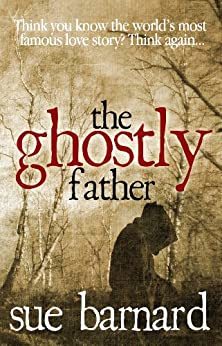
Romeo and Juliet - was this what really happened?
When Juliet Roberts is asked to make sense of an ancient Italian manuscript, she little suspects that she will find herself propelled into the midst of one of the greatest love stories of all time. But this is only the beginning. As more hidden secrets come to light, Juliet discovers that the tragic tale of her famous namesake might have had a very different outcome...
A favourite classic story with a major new twist.
The Coffee Pot Book Club
★★★★★
Highly Recommended
Read the full review HERE!
Sue Barnard
 Sue Barnard is a British novelist, editor and award-winning poet whose family background is far stranger than any work of fiction. She would write a book about it if she thought anybody would believe her.Sue was born in North Wales but has spent most of her life in and around Manchester, UK. She speaks French like a Belgian, German like a schoolgirl, and Italian and Portuguese like an Englishwoman abroad.
Sue Barnard is a British novelist, editor and award-winning poet whose family background is far stranger than any work of fiction. She would write a book about it if she thought anybody would believe her.Sue was born in North Wales but has spent most of her life in and around Manchester, UK. She speaks French like a Belgian, German like a schoolgirl, and Italian and Portuguese like an Englishwoman abroad.Her mind is so warped that she has appeared on BBC TV’s Only Connect quiz show, and she has also compiled questions for BBC Radio 4’s fiendishly difficult Round Britain Quiz. This once caused one of her sons to describe her as “professionally weird.” The label has stuck.Sue lives in Cheshire with her extremely patient husband and a large collection of unfinished scribblings.
Connect with Sue: Ocelot Press • Blog • Twitter • Amazon Author Page.
Welcome to Day #1 of the blog tour for The Smallest Crack by Roberta Kagan @RobertaKagan

The Smallest Crack
Book One of the Holocaust Story Series
By Roberta Kagan

1933 Berlin, Germany.
The son of a rebbe, Eli Kaetzel, and his beautiful but timid wife, Rebecca, find themselves in danger as Hitler rises to power. Eli knows that their only chance for survival may lie in the hands of Gretchen, a spirited Aryan girl. However, the forbidden and dangerous friendship between Eli and Gretchen has been a secret until now. Because, for Eli, if it is discovered that he has been keeping company with a woman other than his wife it will bring shame to him and his family. For Gretchen her friendship with a Jew is forbidden by law and could cost her, her life.
Today we are stopping over on
Candlelight Reading for a sneak-peek
between the covers of The Smallest
Crack.
Click Here!

Welcome to Day #4 of the blog tour for The Promise #HistoricalRomance #WW2 @KathleenHarrym1 @jroberts1324
The Promise
A World War II Historical Romance
By Kathleen Harryman and Lucy Marshall
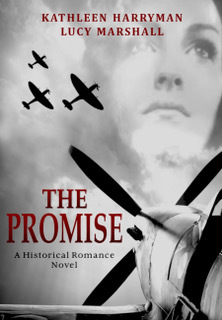
How far would you go to keep a promise?
In the heat of battle, one man's promise to another will be tested.
September 1939
As Britain is gripped by the fear and uncertainty of war, Tom Armitage stands to gain the one thing that he never thought possible - his freedom.
Rosie Elliot sees her future crumbling to dust as Will Aarons leaves Whitby with Jimmy Chappell to fight in the war. As she begins work at The Turnstone Convalescent Home, Rosie finds something she thought she had lost. Friendship. But friendship soon turns to love. Can this new love replace Will?
This is not an ordinary love story.
It's a story of love, loss, courage, and honour.
Of promises that must be kept or risk losing everything you've ever held dear.
Today we are stopping over on The Books Delight for a sneak-peek between the covers of The Promise.
Click HERE!

August 23, 2020
Check out Marilyn Pemberton's fabulous book — Song of the Nightingale: a tale of two castrati #HistoricalFiction #HistoricalThriller @mapemberton54

Song of the Nightingale:a tale of two castrati
By Marilyn Pemberton

Philippe, the narrator of this tale, is secretary to Count De Lorenzo, and lover to the Count’s young wife. He is tasked with buying young boys from poor villagers, having them castrated and taking them to Florence to be taught to sing as castrati. The parents are told that their sons are especially blessed with their wonderful voices and they do not object to the boys making a physical sacrifice in order to thank and praise the Lord; nor to the bag of gold they are given in exchange.
The boys are innocents, victims of circumstances beyond their control. Surely they can have nothing to do with a barber’s mysterious death, or the suicide of an abusive Jesuit priest?
This is a tale of passion, revenge, guilt, regret, loss and redemption.
Excerpt
Once I had put Luigi back into his bed I lay down on my own. I was exhausted and hoped that sleep would come quickly. I did not drift off to sleep, however, but rather back to the morning that this ill-conceived journey had started.
Davide and I had arrived at Montalcino just as the sun’s nascent rays were casting out the night-time shadows, revealing the rough, ill-repaired dwellings of the families I had come to break up. All the village was awake by now, preparing for another day working in il Conte’s vineyards, but we approached the house from whence came a wave of sound: women sobbing, men remonstrating, children whining, babies wailing. I dismounted and as I walked tentatively towards the house the noise slowly abated into an eerie silence, broken only by the blood pounding in my ears. I couldn’t yet see inside but the house itself seemed to be glaring at me, and having judged me, found me very much wanting.
I hesitated in the doorway. I could now see that the room was packed with people, all of them facing towards me, motionless, as if frozen by a sorcerer’s curse. I searched the faces for one I recognised but in such a close community they all had similar features and I could not distinguish one from another. No-one moved but I felt as if they were all pressing onto my chest, stifling me. I stepped back outside and took a deep breath of the fresh morning air. This seemed to break the spell for everyone surged out and formed a circle around me, their closeness and hostility making me sweat.
I had to take control. ‘Are the boys’ fathers here?’ I was ashamed to realise I didn’t even know their names. There were murmurings and shufflings and eventually five men stepped forward. Not only were their faces akin, so too their expressions of distrust and disdain. I suddenly felt angry at il Conte for putting me in this position, at his arrogance and self-indulgence. My guilt made me harsh. ‘You are here then, to exchange your sons, each for a bag of gold?’
They glanced at each other, then one spoke for them all, his tone defiant. ‘Conte De Lorenzo promised they will have more opportunities and be able to earn good money.’ He hesitated, ‘And the gold will help to repair our houses, buy more stock and better our own lives. God gave our boys their voices and it would be sinful of us to waste that gift.’
I felt embarrassed that they were putting their trust in a man who I knew to be only interested in his own aggrandisement. I could have, should have, tried to dissuade them, but I wanted to keep my job and the security and life-style it gave. ‘As il Conte explained to you, they will spend quite a few years in the conservatoire in Florence, where they will be taught to sing properly. They will certainly be well looked after there and if they work hard and it is God’s will then, yes, they will have a better life and will earn good money.’ More murmurs, shuffles and furtive glances. ‘So, I have five bags of gold here, one for each boy.’ The words tasted foul in my mouth but I swallowed them. I took a leather pouch and poured the coins into my palm, the sunlight glinting off the golden faces. A gasp encircled me and the five men, the five fathers, smiled and nodded. They each held out their hands.
‘The boys first.’ When had I learned to be so callous? The men called into the crowd, which separated as the five mothers led their boys to me. The women’s eyes were red rimmed and as I handed a bag to the father, I had to tear the son from the mother’s grip.
As Davide had driven the carriage out of the village I had looked back. The reflection of the sun off the gold that was already being eagerly counted had blinded me and the screams of the mothers had deafened me. The carriage had lurched round a corner and the huddle of villagers had been lost to sight. But I could still hear the screaming.
I woke with a start, realising I was in fact in my bed and that I could still hear screaming.
It was Fabio. He was sitting bolt upright in his bed, the sheet thrown to the floor. He was staring in horror at his linen binding and he screamed and screamed.
I rushed over to him, sat on the edge of the bed and took his hand in mine.
‘Hush now, Fabio, it’s all right. Everything went well. Are you in any pain? Are you thirsty?’
Fabio looked at me with his black eyes filled with panic. He stopped screaming but then leaned towards me and threw up all over me.
I heard giggling in the doorway. It was Lizzie, holding a jug of water and more squares of linen.
‘Don’t just stand there, come and help me clean this up.’
She may only have been twelve but she was a good and efficient worker. Whilst I changed my clothes she gave Fabio a drink, wiped his face and changed his binding. He was calmer when I returned to his side and he gave me a sheepish grin.
‘Sorry, signor Agostini. I was dreaming I was in the barn with Roberto. I had forgotten about,’ he pointed down to his middle section ‘about all this. I am alright now. It doesn’t hurt very much. Actually, I am quite hungry.’
‘You’re always hungry.’
It was Roberto, propped up on one elbow, his hair tousled, still stark naked. I smiled at his brazenness. ‘How are you feeling, Roberto?’
‘Good, thank you, signor Agostini.’
‘I wish you would both call me Philippe. Are you hungry too?’
Roberto nodded then gingerly swung his legs over the side of the bed. He tried to stand up but gave a yelp of pain and sat back down again.
Il Barbiere’s wife, Mathilde, stood in the doorway, holding a tray. ‘Don’t go rushing things, young man. Wait a moment and I’ll help you.’ She put the tray onto the table and then went over to Roberto’s bed. She took hold of his upper arm then lifted him up. ‘Try and stand upright, don’t bend. The pain will pass.’
Roberto stood for a minute, his mouth a thin, determined line, then he gave a stiff nod and, guided by the wife, he walked with small, shuffling steps across to the table.
I similarly supported Fabio, and when he was seated they both fell onto the bread and cheese with great gusto. Whilst Mathilde poured out three cups of milk I went over to Luigi’s bed. I could see immediately that things were not right. He was burning with fever. I wiped the sweat from his face with the red and white spotted neckerchief that he was so proud of, but I made no impression. His eyes were open but unfocussed; he looked through, not at me. He was mumbling the same thing over and over again.
‘Mama, Mama, Mama.’
Mama, who had sold him for a bag of gold.
Pick up your copy of
Song of the Nightingale
Add Song of the Nightingale to your ‘to-read’ list on

Marilyn Pemberton

Marilyn Pemberton retired from being a full-time IT Project Manager in October 2019. During research for her PhD, Marilyn “discovered” Mary De Morgan, a Victorian writer. Marilyn wrote Out of the Shadows: The Life and Works of Mary De Morgan, (Cambridge Scholars Publishing, 2012). There were still many gaps in her knowledge and she decided to write a fictional novel based on De Morgan’s life - The Jewel Garden (Williams & Whiting, 2018). This novel was a semi-finalist in the Chanticleer 2019 International Goethe Book Award for post 1750s Historical Fiction.
Marilyn’s second novel, The Song of the Nightingale: a tale of two castrati, (The Conrad Press, 2019), is a historical novel, set in 18th century Italy that tells of two young boys who are bought from their families, castrated and then trained to be singers. It tells of passion, revenge, jealousy, love and redemption. It has just won the Fiction category of the 2020 International Rubery Book Award.
Marilyn is currently working on the second book of a trilogy that will tell of three generations of women who are story-tellers but who face sometimes insurmountable obstacles to getting their her-stories heard.
Connect with Marilyn:
Website • Blog • Facebook • Twitter.
Check out Michael L. Ross' fabulous book — Across the Great Divide: Book 1 The Clouds of War #HistoricalFiction # AmericanCivilWar @MichaelLRoss7

Across the Great Divide:Book 1 The Clouds of WarBy Michael L. Ross
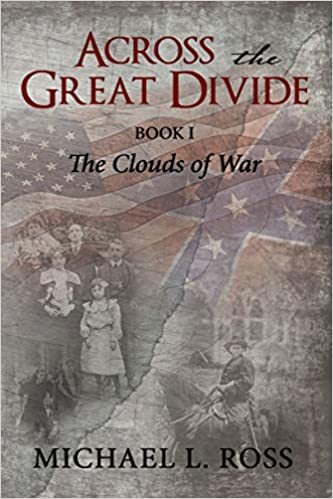
Lexington, Kentucky, 1859. After saving John Hunt Morgan from a puma attack, fifteen-year-old farm boy Will Crump joins Hunt’s militia, the Lexington Rifles. Morgan mentors Will and enrolls him in the local university, where he hopes to study law. As tensions rise between the North and South, Will is torn between his loyalty to Morgan and his love for his family. Will’s father, sisters, and sweetheart follow the Union, while Morgan and Will commit to the South. As part of Morgan’s band, Will participates in ambushes and unconventional warfare until his first real battle at Shiloh. He fights bravely, but increasingly questions what the war is accomplishing, and whether his devotion to honor has led him astray. And where is God in all this killing?
Will’s sister Albinia, friend of the Clay family, becomes increasingly aware of the plight of the slaves. When she finds Luther, a slave she knows, trying to escape, she must decide between her conscience, and her friends. She becomes involved in the Underground Railroad, helping slaves to freedom – but will it cost her love and her freedom?
Will’s other sister, Julia, is approaching spinster status and despairs of ever meeting a man who can give her more than life on a farm until she meets Hiram Johannsen, a son of immigrants who owns a steamship company. They marry and she makes a new life in the North. When Hiram answers the call to fight for the North, Julia runs the steamboat company in her husband’s absence and uses her boats to help Albinia ferry escaped slaves to freedom. Her business relations put her in the perfect position to spy for the North. When the Confederates capture her, will she survive?
Luther is one of the first slaves Albinia helps flee the South after his master cruelly abuses his mother and sister. He escapes with his family, and when war breaks out, he fights for the North as an auxiliary of the Third Ohio Cavalry, alongside Julia’s husband, Hiram, and against Morgan and Will. Luther has to confront the demons of his past, an abusive master, and a slave catcher that kills his little sister. Will the desire for revenge destroy him?
Throughout the war, Will is forced to examine and question everything he believes in—his faith in God, his love for his family, his loyalty to Morgan, and his worth as a human being.
Will and his family must somehow mend the torn fabric of relationships to find peace, and reach Across the Great Divide.
The Coffee Pot Book Club
★★★★★
Highly Recommended
Read the full review HERE!

Pick up your copy ofAcross the Great DivideAmazon UK • Amazon US
Michael L. Ross
 Amazon bestseller Michael Ross is a lover of history and great stories. He’s a retired software engineer turned author, with three children, and five grandchildren, living in Newton, Kansas with his wife of 39 years. Michael graduated from Rice University and Portland State University. He was born in Lubbock, Texas, and still loves Texas. He’s written short stories and technical articles in the past. “Across the Great Divide: Book 1 The Clouds of War” is his first novel
Amazon bestseller Michael Ross is a lover of history and great stories. He’s a retired software engineer turned author, with three children, and five grandchildren, living in Newton, Kansas with his wife of 39 years. Michael graduated from Rice University and Portland State University. He was born in Lubbock, Texas, and still loves Texas. He’s written short stories and technical articles in the past. “Across the Great Divide: Book 1 The Clouds of War” is his first novelConnect with Michael: Website • Twitter • Goodreads.
August 20, 2020
A Conversation with #HistoricalFiction author and publisher, Richard Foreman. Grab you copy of Rubicon: A HWA Short Story Collection for only 0.99 on #Kindle for a Limited Time @SharpeBooks

A Conversation with Historical Fiction author and publisher, Richard Foreman
Please give a warm Coffee Pot welcome to Richard Foreman.

Mary Anne: Congratulations on the release of Rubicon: A HWA Short Story Collection. What is it about the Roman era that appeals to the reader, and why did you, as a publisher, decided to release a short-story collection that focused on this period in history?
Richard Foreman: The stories in Rubicon allow the authors involved to showcase their various series and characters. The tales encompass the Roman Republic and Roman Empire – and cover different sub-genres such as crime, espionage and military history. The purpose of Rubicon – and other HWA collections – is to cross-pollenate readerships. The book introduces the fans of Anthony Riches and SJ Turney to the readers of Peter Tonkin and LJ Trafford. The Roman world fascinates and resonates I think because it is simultaneously different and similar to today’s society. Cicero’s wit and political insights are relevant still – yet at the same time Ancient Rome, whether through its alien customs or characters, seems exotic. The project was an opportunity to collaborate with the HWA and a group of writers who I know and admire from writing Roman fiction myself. Also, I am not alone amongst authors in receiving requests from fans to write more stories related to certain series and characters I’ve created over the years. A Brief Affair, which is linked to my Spies of Rome series, is partly a thank you to my readers.
Mary Anne: Ten authors contributed to this collection. What makes these particular authors stand out, in your opinion, on what is a considerably crowded bookcase?
Richard Foreman: Most of the authors who we invited to contribute to the collection are veteran historical novelists. Not in the sense of their ages, but that they have lived and breathed the period for several years. Ancient Rome is in their blood. They know their characters and genres inside out. The authors brought a sense of fun and scholarship to their tales, whether dealing with Ovid in exile or a Roman spy sleeping with one mistress too many. One of the reasons why the bookcases are so overcrowded in relation to the period is that there is a wealth of talent, particularly in the UK and US, writing about Ancient Rome. Like chocolate, human folly and the little black dress, Ancient Rome never seems to go out of fashion.
Mary Anne: Short-stories have always appealed to the reader, why do you think this is?
Richard Foreman: Various reasons. Short stories can serve as a taster menu for longer works by the author. They’re not too time consuming in a time precious world. They can be great models of brevity, pace and wit – an espresso shot of truth. Short stories can be wonderfully entertaining and literary. When younger I went through a period of devouring short stories by Chekhov. The short Sherlock HoImes cases are gems too, for different reasons. I was so enamoured with the Pat Hobby short stories by F. Scott Fitzgerald that I decided to write my own, involving the drunken screenwriter. It’s often the case that authors like writing them as well of course – and their talent and sense of fun shines through in the genre.
Mary Anne: Rubicon: A HWA Short Story Collection is the first book in The Historical Writers Association short-story collection series. Can you tell us a little more about the other collections?
Richard Foreman: To date there are four collections published, involving a whole host of authors (including Antonia Senior, Michael Jecks, Robert Wilton, Steven Veerapen and Elizabeth Fremantle). By the Sword covers the Medieval period, Royal Blood deals with the Tudor era and Victoriana profiles the 19th century. The stories serve as a showcase for an author’s longer works, but they are also useful as a calling card for the kind of novels that Sharpe Books are looking for, in relation to submissions. Should other writers read the collections and feel that they have written books - or are writing books - of a similar ilk then I would urge them to get in touch via sharpebooks.com and cross the Rubicon, so to speak.
Mary Anne: As a publisher, what is your definition of successful historical fiction?
Richard Foreman: The simple answer I think is that a book is successful if it prompts enough readers to want to read another work by that author (or indeed another author). This is partly why Sharpe Books is keen to take on novelists, new or established, who write series. Historical fiction can inform and entertain in a variety of ways, exhibited by the depth and diversity of the different HWA collections. Success can manifest itself in different forms too. I wrote a novel, Warsaw, many years ago set during the holocaust. The book sold extremely well and went into the Amazon top 20 - but what is particularly pleasing about the book is that I still regularly receive correspondence about it, saying how much the novel meant to readers. The nature of historical stories, which are seldom dated, mean that a book’s success can be measured over a period of time, rather than what it sells during the first month of publication. The past can be timeless.
Rubicon:
A HWA Short Story Collection
By Nick Brown, Gordon Doherty, Ruth Downie, Richard Foreman, Alison Morton, Anthony Riches, Antonia Senior, Peter Tonkin, L.J. Trafford and S.J. Turney

Ten acclaimed authors. Ten gripping stories.
Immerse yourself in Ancient Rome through a collection of thrilling narratives, featuring soldiers, statesmen and spies.
Read about some of your favourite characters from established series, or be introduced to new writers in the genre.
The stories in Rubicon are, like Rome, diverse and intriguing - involving savage battles, espionage, political intrigue and the lives of ordinary - and extraordinary - Romans, such as Ovid, Marcus Agrippa and a young Julius Caesar.
This brand new collection, brought to you by the Historical Writers' Association, also includes interviews with each author.
Find out more about their writing processes and what attracts them to the Roman world.
View Ancient Rome through fresh eyes.
Rubicon is a feast of moreish tales and a must read for all fans of historical fiction.
Authors & Stories Featured in Rubicon:
Nick Brown - Maker of Gold
Gordon Doherty - Eagles in the Desert
Ruth Downie - Alter Ego
Richard Foreman - A Brief Affair
Alison Morton - Mystery of Victory
Anthony Riches - The Invitation
Antonia Senior - Exiles
Peter Tonkin - The Roman
L.J. Trafford - The Wedding
S.J. Turney - The Praetorian
Praise for Rubicon: A HWA Short Story Collection
"Greater than the sum of its parts... Rubicon has something for everyone: action, humour and historical insight."
Michael Arnold
"Rubicon is a declaration of intent to intrigue, inspire and entertain…”
Giles Kristian.
Rubicon is currently available on Special Promotion for 99c/p.
Grab your copy today!
Add Rubicon to your ‘to-read’ list on

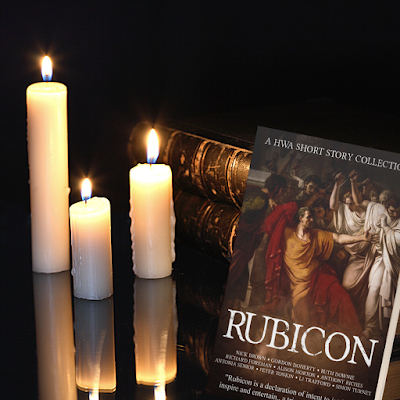
Richard Foreman
Richard Foreman is the bestselling author of numerous historical series set during the Roman Republic and Roman Empire, including the Augustus Caesar books, Sword of Empire and Sword of Rome. He is also the author Warsaw, Raffles: The Complete Innings and Band of Brothers, a series charting the story of Henry V and the Agincourt campaign. He lives in London.
Siege
(The First Crusade Book #1)
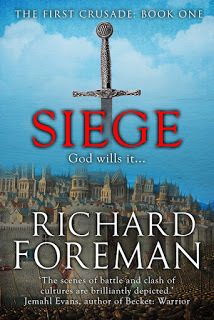
"A really good read for anyone interested in the First Crusade. Tight and fast-paced, the author's beguiling sense of setting combines with strong characterisation to make Siege a rollicking yarn."
Richard Woodman, Sword of State.
"Siege is a very human story, set amongst the mess and destruction of a mad war. The author tells a swift, enthralling tale, enriched with historical detail and believable, engaging characters. Highly recommend."
J. A. Ironside, The King's Knight.
Spies of Rome
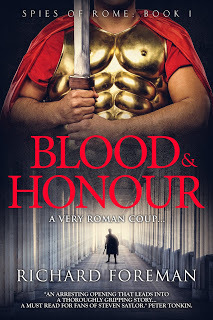 "A masterful and evocative depiction of a fledgling imperial Rome fraught with intrigue and at war with itself. The story and characters are as striking as the graffiti that adorns the violent city’s walls during Augustus' rise."Steven Veerapen, author of The Abbey Close."An arresting opening that leads into a thoroughly gripping story. Impressive research and understanding of the period allows Richard Foreman to move so seamlessly and effectively from historical epic to historical detective thriller. A must read for fans of Steven Saylor." Peter Tonkin, author of The Ides.
"A masterful and evocative depiction of a fledgling imperial Rome fraught with intrigue and at war with itself. The story and characters are as striking as the graffiti that adorns the violent city’s walls during Augustus' rise."Steven Veerapen, author of The Abbey Close."An arresting opening that leads into a thoroughly gripping story. Impressive research and understanding of the period allows Richard Foreman to move so seamlessly and effectively from historical epic to historical detective thriller. A must read for fans of Steven Saylor." Peter Tonkin, author of The Ides.
Amazon
Augustus: Son of Rome
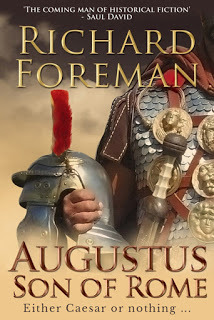
'Augustus: Son of Rome forges action and adventure with politics and philosophy. This superb story is drenched in both blood and wisdom - and puts Foreman on the map as the coming man of historical fiction’.Saul David, Author of the Zulu Hart series.
Amazon
Raffles:
The Complete Innings

‘Classy, humorous and surprisingly touching tales of cricket, friendship and crime.’David Blackburn, The Spectator.
Amazon
Band of Brothers:
The Complete Campaigns
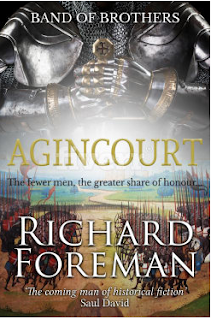 'Escapism at its best... A great read that tells much about the style of war and how the individuals fought.'Michael Jecks.'A rattling good yarn, requiring only the minimum of suspension of belief, and leaves one eagerly anticipating the next instalment of the adventures of the team as they accompany the King to Harfleur.' Major Gordon Corrigan, author of A Great and Glorious Adventure: A Military History of the Hundred Years War.
'Escapism at its best... A great read that tells much about the style of war and how the individuals fought.'Michael Jecks.'A rattling good yarn, requiring only the minimum of suspension of belief, and leaves one eagerly anticipating the next instalment of the adventures of the team as they accompany the King to Harfleur.' Major Gordon Corrigan, author of A Great and Glorious Adventure: A Military History of the Hundred Years War.Amazon
Warsaw

"Warsaw is a work of power. It has the authentic feeling that pulses from an important book. The meticulous research and psychological insights light up one of the most ghastly episodes in the history of man's inhumanity to man."Patrick Bishop, author of Fighter Boys and A Good War.
Amazon
August 19, 2020
Catherine Taylor is sharing an excerpt from her fabulous book — Beyond The Moon #HistoricalFiction #TimeTravel #WW1 @CathTaylorNovel

Beyond The Moon
By Catherine Taylor

A strange twist of fate connects a British soldier fighting in the First World War in 1916 and a young woman living in modern-day England a century later, in this haunting literary time travel novel.
In 1916 1st Lieutenant Robert Lovett is a patient at Coldbrook Hall military hospital in Sussex, England. A gifted artist, he’s been wounded fighting in the Great War. Shell shocked and suffering from hysterical blindness he can no longer see his own face, let alone paint, and life seems increasingly hopeless.
A century later in 2017, medical student Louisa Casson has just lost her beloved grandmother – her only family. Heartbroken, she drowns her sorrows in alcohol on the South Downs cliffs – only to fall accidentally part-way down. Doctors fear she may have attempted suicide, and Louisa finds herself involuntarily admitted to Coldbrook Hall – now a psychiatric hospital, an unfriendly and chaotic place.
Then one day, while secretly exploring the old Victorian hospital’s ruined, abandoned wing, Louisa hears a voice calling for help, and stumbles across a dark, old-fashioned hospital room. Inside, lying on the floor, is a mysterious, sightless young man, who tells her he was hurt at the Battle of the Somme, a WW1 battle a century ago. And that his name is Lieutenant Robert Lovett…
Excerpt
Chapter One
Coldbrook Hall Military Hospital, Sussex, England, August 1916
Footsteps, then a rap at the door. Lying in bed, Robert jumped. Was there really someone there or was he dreaming? He could barely tell any more if he was asleep or awake.
There was a painful swell of yellow-grey light, and he felt his pupils contract. Ah, so he was definitely awake then. The light receded as the door closed behind whoever had come in. A doctor, by the sound of the brisk footfall and confident knock.
‘Good evening, Lieutenant,’ a man said. ‘How are we this evening?’
‘Much the same, sir. I’m sorry, who is this? I’m not awfully good at telling voices apart.’
‘It’s Major Hughes, the neurologist. You’ll find it remarkable how your other senses learn to compensate over time. Some sightless people even come to know when an object is close by, through some extraordinary sixth sense they develop. But of course, we hope things will improve for you before it comes to anything like that.’
More footsteps – and another stab of pain as light spilled into his head again. He screwed his eyes shut. A nurse bade him good evening. He could hear the hiss of the gas lamp on the landing outside. He said, ‘Could you push the door to, please? I find the light painful.’
‘Come now, Mr Lovett, you must get used to the light again eventually,’ the doctor said. ‘How do you expect to regain your sight lying here in the dark? Don’t you want to recover?’
‘More than anything,’ Robert responded fiercely. ‘It’s the only thing I want, to get better and return to France, to my men.’
‘Yes of course, of course,’ the doctor said quickly. ‘You are an officer recommended for the Military Cross. I didn’t mean to imply . . . I beg your pardon; that was tactless of me. Push the door to, please, Sister. Leave it just a little ajar so I can see well enough to examine the lieutenant.’
Robert heard the stethoscope slip from the doctor’s neck. That sound, at least, was familiar.
‘Breathe in . . . and out. Again, please. Good. And hold out your hands in front of you. Still rather unsteady. Sister, would you please undo the lieutenant’s dressing, so I may examine his leg? And how are the headaches at night? Any improvement?’
‘I’m afraid not, sir.’
‘And you’re still troubled by nightmares?’
‘Yes. When I finally manage to fall asleep. Or at least I think I’ve been asleep. I can’t always tell.’
‘It’s important that you try to sleep only at night, to help maintain the distinction between night and day – apart from a good hour’s nap after luncheon. I’m glad to say your wound is looking better, Lieutenant. Very well, I think it best we continue with the same regimen: isolation, rest, a light invalid diet – beef tea, milk, calves foot jelly – and daily massage to your injured leg.’
‘Please, no more jelly. I can’t bear it. And I’m so terribly bored. If I were to be allowed the occasional visitor . . . ’
‘It really is quite the best thing for you. You mustn’t be overtaxed in any way. We may try bromides to help you sleep. And if your sight doesn’t improve in the next few weeks, we may consider faradism to the orbital ridge.’
‘What’s that?’
‘The application of an electrical current. It’s proven successful in some cases of hysterical blindness like yours, where there’s no organic cause for the sight loss.’
‘Then I should like it as soon as possible, sir.’
‘Patience, Mr Lovett; one step at a time. You’ve been through a harrowing experience. One must respect Mother Nature.’
‘Even when her processes are inscrutable? I simply want to be better.’
‘I know. I understand. But I’m afraid it doesn’t work quite like that. We’re not even sure of the mechanism of your sight loss. And as I’ve warned you before, there may be permanent damage; it may be that you won’t ever be able to paint again. You must try to be optimistic, but at the same time prepare yourself for any eventuality. Now I’ll let you get back to your rest. Good evening.’
They left, and the room brimmed with silence and anguish once more. Oh God, would he ever see again – well enough even to wash or feed himself, let alone paint landscapes and still-life pictures? Or would he be shut up forever in this crypt of shadows, wretched, a prisoner in his own body, shirking his duty while the Somme campaign went from bad to worse, neglecting his men, seeping away from the world bit by bit? He couldn’t even see his own face in the mirror. He felt he was turning into a ghost or a spirit – a figment of his own imagination.
He would sacrifice his art, he promised now to whatever gods might be listening, if in return it meant he might see well enough to lead his men once more. That, alone, mattered. Painting belonged to another life – a higher, more rarefied existence, which no longer concerned him. He had fallen a long way from grace; he was a base, primitive creature now.
It began to rain. He liked rain. The patter on the stone terrace outside his room gave a sort of shape back to the world and made it familiar once more. A minute or two later, through the shutters, came the overwhelming scent of rain on grass. He took slow, deep breaths, and for the first time in weeks the commotion in his head seemed to quieten.
Some time later he jerked awake, his arms flailing at the darkness, as if he could somehow claw it away and reveal the world hidden behind it. He choked air back into his lungs and sat up. He was bathed in sweat. The same nightmare; always the same. The world created by his sleeping mind, with its chaotic images and colours, was so much more real than the physical world.
His room was soundless and still. With a shaking hand he felt for the bedstead. There it was, just behind him, solid and cool. Thank God. He put his hand between the metal rails and splayed his fingers across the smooth wall. His head throbbed.
He felt for the little clock they’d given him which allowed the blind to tell the time. It had a glass front which unclasped. He had to open it carefully or the tremor in his hands would cause him to drop it. Very slowly, he opened it and touched his fingers to the little metal hands and the symbolic bumps above them. Just after twenty to three in the morning.
He stumbled out of bed and, on hands and knees, his injured leg throbbing, managed to feel his way over to the far corner of the room. Even though he couldn’t see, he understood that this spot would command a good view of both the door and window. The enemy might come either way.
He wedged himself into the space between the chest of drawers and the armchair. The cabinet reminded him of the one in his mother’s dressing room – solid and heavy, with a scent of beeswax. A good smell. Smells scared him more than anything now – strong ones in particular, which might signify chemicals. The wall at his back was cool and hard. He let its solidity flow into him and gradually his breathing slowed.
He stayed there for a long time, until he felt calmer. Then he managed to haul himself to his feet – and realised that he didn’t have his stick. He staggered forward a few steps, lost his balance then keeled over into the blackness. He landed on his stomach, winding himself. He seemed to be tangled up in a chair. He tried to free himself, but found he was stuck fast.
For the first time since he’d awoken to find himself sightless, he wept – gulping, angry tears like he hadn’t cried since he was a child. Over and over he called out for help, but no one answered, and he lay with his face pressed to the floor, his tears soaking into the wooden boards.
At last, perhaps hours later, he thought he heard a sound below. He called out once more.
‘Hello?’ He heard the taut anguish in his voice. ‘Is there someone there? Please, can you help me? I’ve fallen. Hello?’
Finally, miraculously, he heard a woman’s voice, muffled but distinct: ‘Just a minute, I’m coming!’
He began to cry again, this time with relief.
***
Sussex Downs April 2017
So that’s it then, she thought, I’m all on my own. Not a soul left in the world I can call family any more. Except for my father, of course – but he doesn’t count.
Louisa’s legs ached from the steep climb up the cliff path, but finally she was at the top. She sat down on the chalky, flinty ground and looked out to sea. And her grandmother’s absence hit her with a blow that seemed to knock all the air from her lungs. She lay back, soft and exposed, a snail without a shell, while the ravens and gulls wheeled endlessly overhead, untethered. Had she been cut free from the earth too? she wondered. What held her in this place now? What held her anywhere?
She reached for the old, familiar wooden box she’d brought with her and took out the bottle inside. P. Aubert & Co. Cognac 1915, the label read. It had been given to some great-great-uncle of Granny’s by his commanding officer at the end of the First World War. As a child it had been one of Louisa’s favourite treasures in their overflowing cottage, along with a pair of faded red silk shoes from Imperial China and a set of children’s encyclopaedias from the 1930s.
Granny had always said the cognac must stay in the sideboard, in the dark. But Louisa had taken it out when her grandmother’s back was turned. To her it looked like liquid gold trapped behind the glass, and she hadn’t been able to conceive what it would be like to drink something so old. She’d always imagined it would be like drinking history itself.
And now the time had come to find out. The day of Granny’s funeral merited a drink, and a bloody good one at that. She uncorked the bottle and took a sip, then lay back to savour it. And discovered that it tasted not of honey, as she’d always expected, but of bitter cloves and pepper. It made her nose sting – and was actually rather disappointing. She took another sip and swallowed with difficulty. It scorched its way down, making her eyes water.
‘Well, here’s to you, Granny.’
She raised the bottle to the sky. For that’s where her grandmother would be. She belonged to the elements now, to this huge blue wing of sky, and the sea, shimmering far below. This was where Louisa felt closest to Granny. Here on the white chalk cliffs of the South Downs, where Granny had brought her the first day she’d moved in to Cliff Cottage. The day of her father’s betrayal.
She lay looking up into the endless blue sky. She felt she could lie here forever and never get up again. Then a raven landed a little way off and began to caw at her.
‘Go away, bird,’ she told it. ‘Leave me alone.’ But she could feel it crouching there, watching her, goading her in her grief. Really, was there no place in the whole world where she might have a bit of peace? Not even up here? Eventually, she shooed it away, then took up the bottle once more and swallowed another mouthful of brandy, then another – and another.
Pick up your copy of
Beyond The Moon
Add Beyond The Moon to your ‘to-read’ list on

Catherine Taylor

Catherine Taylor was born and grew up on the island of Guernsey in the British Channel Islands. She is a former journalist, most recently for Dow Jones News and The Wall Street Journal in London. Beyond The Moon is her first novel. She lives in Ealing, London with her husband and two children.
Connect with Catherine:
Website • Twitter • Instagram.
The Coffee Pot Book Club
...more
- Mary Anne Yarde's profile
- 159 followers



